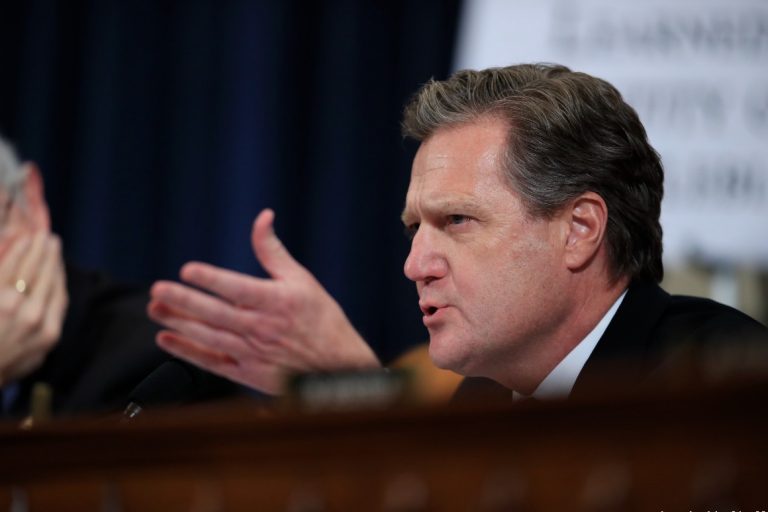The FBI is getting warned to stay away from Congress’ fight over renewing a controversial surveillance program — even by its allies on the Hill.
A portion of surveillance law that’s meant to ease the monitoring of foreign targets, but also gives the intelligence community the power to inadvertently collect the communications of Americans, is set to expire at the end of the year if lawmakers don’t act. While both FBI and Justice Department leadership typically make a personal pitch to Congress for an extension of the program known as Section 702, the deepening chasm between House Republicans and top law enforcement officials has complicated that dynamic.
In short, the House GOP doesn’t trust the bureau. That’s in part because of the bad blood caused by the FBI’s search of former President Donald Trump’s home last year and its Russia investigation, as well as bipartisan suspicions over how the bureau uses the surveillance program. And it means the FBI’s typical entreaty — that keeping its powers intact is essential to national security — won’t carry much weight this time around.
At least, not enough for Congress to re-up the program without changes, according to some of the intelligence community’s biggest allies.
“The FBI is absolutely the problem child in FISA and 702. The abuses are abhorrent. Director [Christopher] Wray is not a compelling advocate for FISA or 702, because he’s not been a compelling advocate for reform,” House Intelligence Chair Mike Turner (R-Ohio) said in an interview.
Turner added that while Wray had “attempted and advanced” some reforms, the FBI director’s effort was “disconnected” from congressional oversight.
Another lawmaker, who also supports extending the program with reforms, put it more bluntly: “I don’t think the FBI, the DOJ, has the credibility with the Republican side any longer to make an argument.”
Back in 2020, then-Attorney General Bill Barr was deeply involved in making the pitch to Republicans during a fight on an unrelated surveillance provision. Yet the lawmaker, granted anonymity to speak frankly, warned Attorney General Merrick Garland against trying to play a similar role this time: “Bill Barr among Republicans is very different than Merrick Garland.”
In the meantime, negotiators are already signaling that they will likely miss the Dec. 31 deadline to re-up the warrantless surveillance program. There’s no chance Congress would agree to a long-term extension as is, but lawmakers are quietly making backup plans to avoid a lapse.
Congress’ tensions with the FBI are multi-faceted, encompassing both Section 702 and the broader surveillance law it’s housed under, known as FISA. That’s in addition to the political tensions that have further frayed the relationship between some House Republicans and law enforcement agencies like the FBI and DOJ.
When it comes to 702 specifically, lawmakers don’t believe the FBI stays within the guardrails of a highly shrouded surveillance program, pointing to a bulk of reported abuses. And it’s gotten personal, too: An FBI analyst used the program to improperly search for a U.S. lawmaker’s name about three years ago, reportedly over fears that he was being targeted by a foreign government.
Rep. Darin LaHood (R-Ill.) recently disclosed he believed he was the one who was the subject of the search. Now, LaHood is leading the House Intelligence Committee’s 702 talks.
But even more pervasive among Republicans, both in and outside of the Capitol, is a general distrust of the FBI fueled in part by the bureau’s clashes with Trump. House Republicans are conducting a sweeping probe into claims of politicization of the Justice Department and the bureau, which fringes of the conference have backed Trump’s calls to “defund.”
The skepticism over the FBI played out publicly when Wray testified before both the House and Senate Intelligence committees, fielding warnings from both sides of the aisle.
He responded to those red flags by touting recent improvements to the surveillance program, pointing to a 93 percent decrease between 2021 and 2022 in the number of FBI searches for U.S. persons — a statistic critics have argued belies how large the number was to begin with. He also noted the creation of an Office of Internal Audit that he said is focused specifically on FISA.
Administration officials are also expanding their scope as they try to make the case for 702 reauthorization, arguing that it is critical on everything from countering cyberattacks and China to tracking Russia’s moves in Ukraine.
The Justice Department has also been offering lawmakers briefings to walk them through the compliance changes they have made in recent years. Those changes include new internal guardrails, like requiring additional layers of review before certain searches can take place, as well as new mandatory training, according to a DOJ memo released earlier this year.
“We clearly have work to do, and we are eager to do it with this committee, to show that we can be worthy stewards of these important authorities,” Wray told House lawmakers.
He’ll be back soon, too. House Judiciary Chair Jim Jordan (R-Ohio), said he expects both Wray and Garland to appear before his panel for routine oversight hearings.
The FBI declined to comment for this article.
Data and talking points are unlikely to tamp down tensions; House Republicans say there’s little the FBI or DOJ could say to regain the conference’s favor. Rather, an appearance before Jordan’s panel, which is stocked with surveillance skeptics, is likely to showcase why the bureau shouldn’t be making the direct pitch about extending the program.
“When Jim Jordan is out there talking about cutting the funding for the FBI, you know, and there’s … intense skepticism about the FBI, I’m not sure that the right first step for my Republican colleagues is to spend a lot of time with the leadership of the FBI,” Connecticut Rep. Jim Himes, the top Democrat on the Intelligence Committee, said in an interview.
And the House GOP has another relevant appearance coming up on their docket: DOJ Inspector General Michael Horowitz will testify before a Judiciary subpanel on Thursday, an appearance first reported by POLITICO, as the committee launches its formal work on 702. He’s all but guaranteed to face questions about his previous findings of widespread errors within warrant applications made to the shadowy FISA surveillance court.
It’s left the Biden administration with a tricky question: If the FBI or DOJ can’t be called upon to make the case, who can?
Turner pointed to Director of National Intelligence Avril Haines and CIA Director Bill Burns as two people who are having to “overcome” some of the frustrations with the FBI. Jordan, meanwhile, asked who in the administration he could work with on 702 reauthorization, only pointed to Turner.
Indeed, it seems unavoidable that the Intel chair and other lawmakers who are committed to renewing the program in some form will have to lead the sales pitch.
That rough sledding doesn’t even factor in negotiations with a Democratic-controlled Senate and White House. And supporters are likely to have to contend with a coalition of libertarian-minded Republicans and privacy-minded Democrats in both chambers who are likely to want to go further if not let the program sunset altogether.
“At this point, we’re pulling together all of our partners that are necessary to find a clear path for reauthorization that also satisfies the real need for reform and … people’s perception that reform and reauthorization cannot be separated,” Turner said.
But he acknowledged that renewing Section 702 in some form is “certainly going to be difficult to accomplish” by year’s end.
One option lawmakers have mulled is passing a short-term extension of the program, giving Congress more time to craft a deal on a longer reauthorization with changes. But questions remain about the viability of such a move and what supporters might trade in exchange for more time.
Himes, who is working closely with Turner, also floated Washington’s favorite back-up plan — a discharge petition, which would allow Republicans to work with Democrats to force a vote — in case GOP detractors make it otherwise impossible to bring to the floor.
“Because this authority is so important, I do think we need, you know, a Plan A, a Plan B and a Plan C,” Himes said.



